There has been a shift in how we think about the office since the covid pandemic. Although on-site working was common, working remotely or in a combined office/at-home setup has recently gained traction worldwide after the pandemic. Even if hybrid work mode have grown more common, there must be methods for optimizing their efficiency.

Best Hybrid Work Tools
In addition, the lack of a physical workplace and regular opportunities to interact with coworkers may sometimes make hybrid work environments stressful. But the introduction of Hybrid Working Tools has solved this problem. However, if you’re unaware of the best hybrid working tool for your organization, you’re at the right place. In this article, you’ll discover the finest tools for hybrid working, along with their features and ratings. Let’s get going!
Table of Contents: hide
Why Do We Need Hybrid Work Tools?
What Is Hybrid Work?
Hybrid work is a working model that combines both remote and in-person work. It allows employees to have the flexibility to work from anywhere while also providing the opportunity for face-to-face interactions with colleagues and clients. In a hybrid work environment, employees may work from home some days and come into the office on other days, or they may work from a combination of locations such as a coworking space or a satellite office.
Why Do We Need Hybrid Work Tools?
As hybrid work becomes more common, there is a growing need for tools to support this work model. Hybrid work tools facilitate collaboration and communication among remote and in-person workers. One of the main reasons we need hybrid work tools is to ensure that remote workers are included in important discussions and decision-making processes. With hybrid work, keeping everyone on the same page can be challenging, especially if some team members are working from home while others are in the office.
Hybrid work tools such as video conferencing, instant messaging, and collaboration software help bridge this gap by allowing team members to communicate and collaborate in real time, regardless of location. Also, it maintains a sense of community and culture within the organization. In a hybrid work environment, it can be easy for remote workers to feel isolated and disconnected from their colleagues.
Top 10 Hybrid Work Tools You Should Try in 2023
Looking for the best hybrid working tools in 2023? These tools will help:
Zoom
As the year 2020 rolled along, Zoom, a robust video conferencing technology, became an integral part of hybrid workers’ toolkits. The way individuals interact at work, in communication, and teamwork has been completely transformed with the introduction of this tool. Users can stay in touch with loved ones and coworkers no matter where they happen to be on the globe. Zoom’s user-friendly features and design enable constant communication and collaboration among geographically dispersed teams.
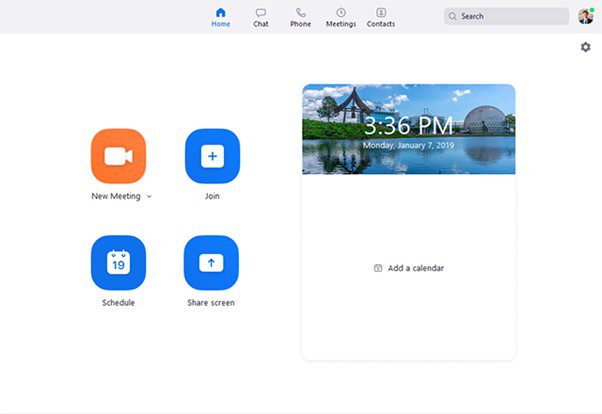
Hybrid Work Tool – Zoom
What Zoom Is Used For
- Provides features including sharing one’s screen, recording one’s video, chatting, and breakout rooms.
- Includes whiteboarding to keep people in touch no matter where they are.
- Makes it easy to maintain contact with your employees without compromising efficiency or message clarity
Supported Platforms: Windows, iOS, Android, macOS, Chromebook, and Linux.
Zoom’s Price Plans: Free to $14.99 per month
Customer Ratings:
- G2: 4.5/5 (52,469 Reviews)
- Capterra: 4.6/5 (13,477 Reviews)
Teamwork
Teamwork is a cloud-based project management software designed to support teams working in a hybrid working environment. It provides a range of features and functions that enable teams to collaborate and communicate effectively, regardless of location. Teamwork includes project planning and task management tools, time tracking, document sharing, and team communication.
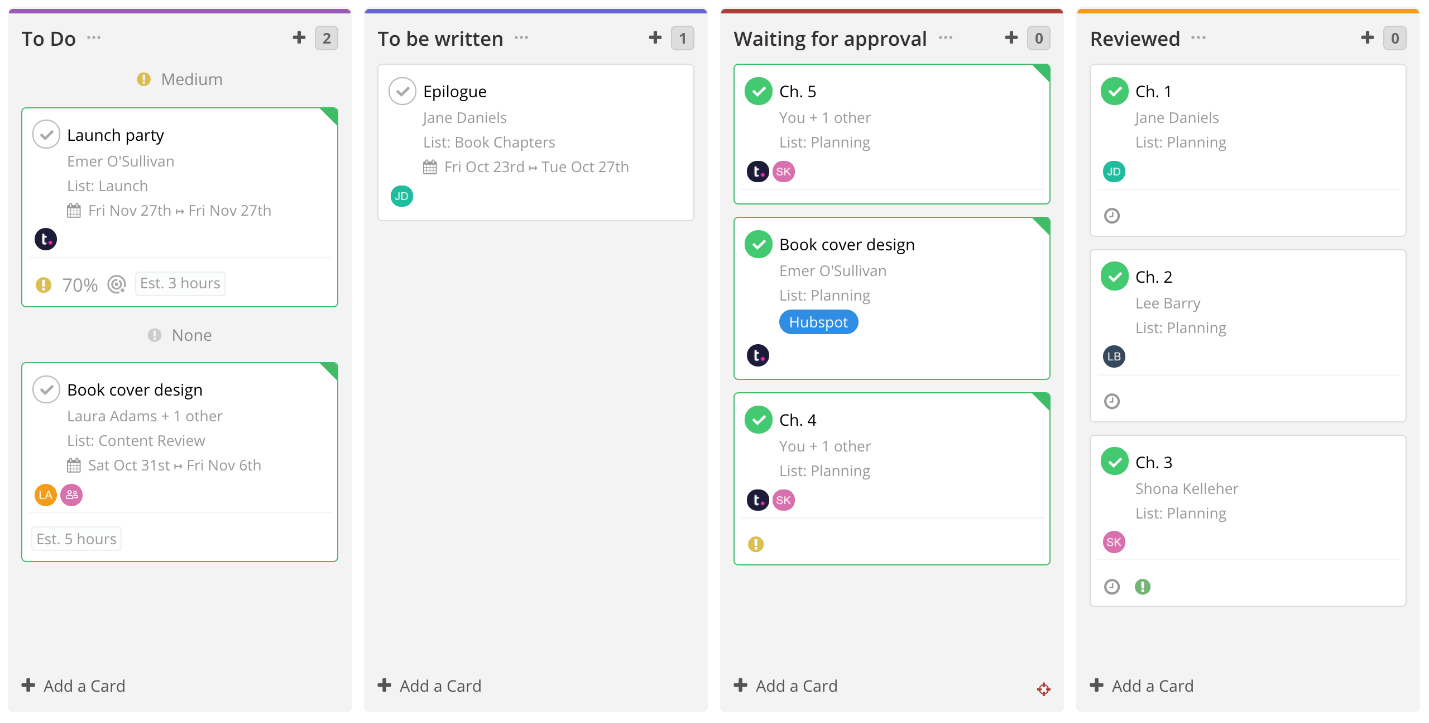
Hybrid Work Tool – Teamwork
What Teamwork Is Used For
- Provides a centralized platform for communication and collaboration, allowing teams to stay connected.
- Allows integrations with other popular business applications like Google Drive, Dropbox, and Microsoft Office.
- Offers advanced reporting and analytics capabilities that help teams to track progress, identify bottlenecks, and make data-driven decisions.
Supported Platforms: Windows and macOS.
Teamwork’s Price Plans: Free to $5.99 per month
Customer Ratings:
- G2: 4.4/5 (1,025 Reviews)
- Capterra: 4.5/5 (786 Reviews)
Chanty
Chanty is a team communication and collaboration tool that aims to make teamwork more efficient and successful. Its features and services allow teams to interact in real-time, exchange files and information, and organize tasks and projects. Chanty features team messaging, audio and video conferences, screen collaboration, and file-sharing facilities.
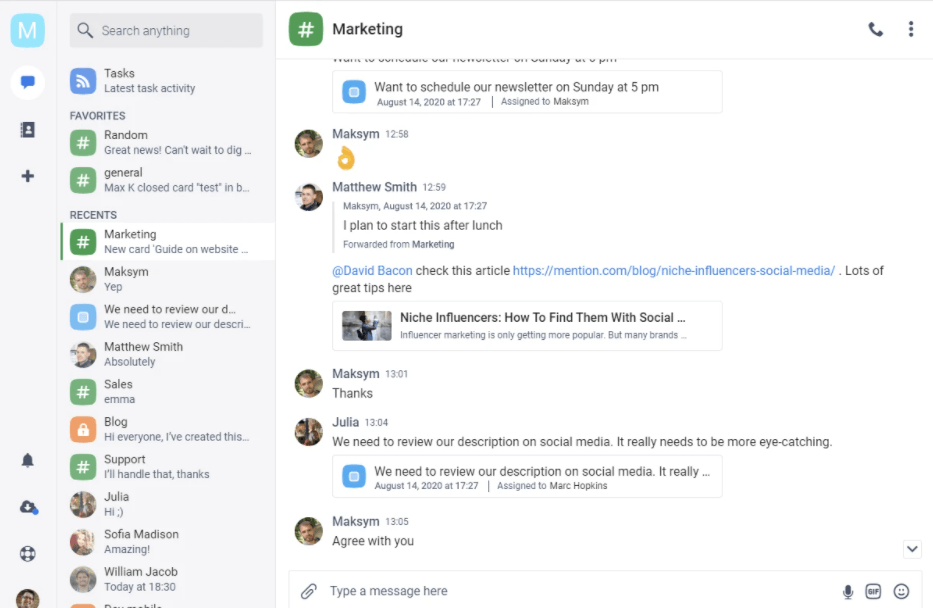
Hybrid Work Tool – Chanty
What Chanty Is Used For
- Comes with a powerful search feature that allows users to find messages quickly.
- Can be customized to suit the unique needs of each team, with features such as custom themes and emojis.
- Provides a task management feature that allows teams to create, assign, and track tasks and projects.
Supported Platforms: Windows and macOS
Chnaty’s Price Plans: Free to $3 per month
Customer Ratings:
- G2: 4.5/5 (38 Reviews)
- Capterra: 4.7/5 (34 Reviews)
CloudApp
CloudApp is a professional software for capturing videos, images, and screencasts. It’s promoted as a speedy method of documenting and distributing business processes using video, GIFs, screencasts, and annotated photos. Whether the user is a freelance artist, developer, software engineer, customer support expert, or business founder, CloudApp strives to simplify sharing. The user’s work is automatically saved in the cloud and may be accessed from any device. Use custom, encrypted short links to share the files online with confidence.
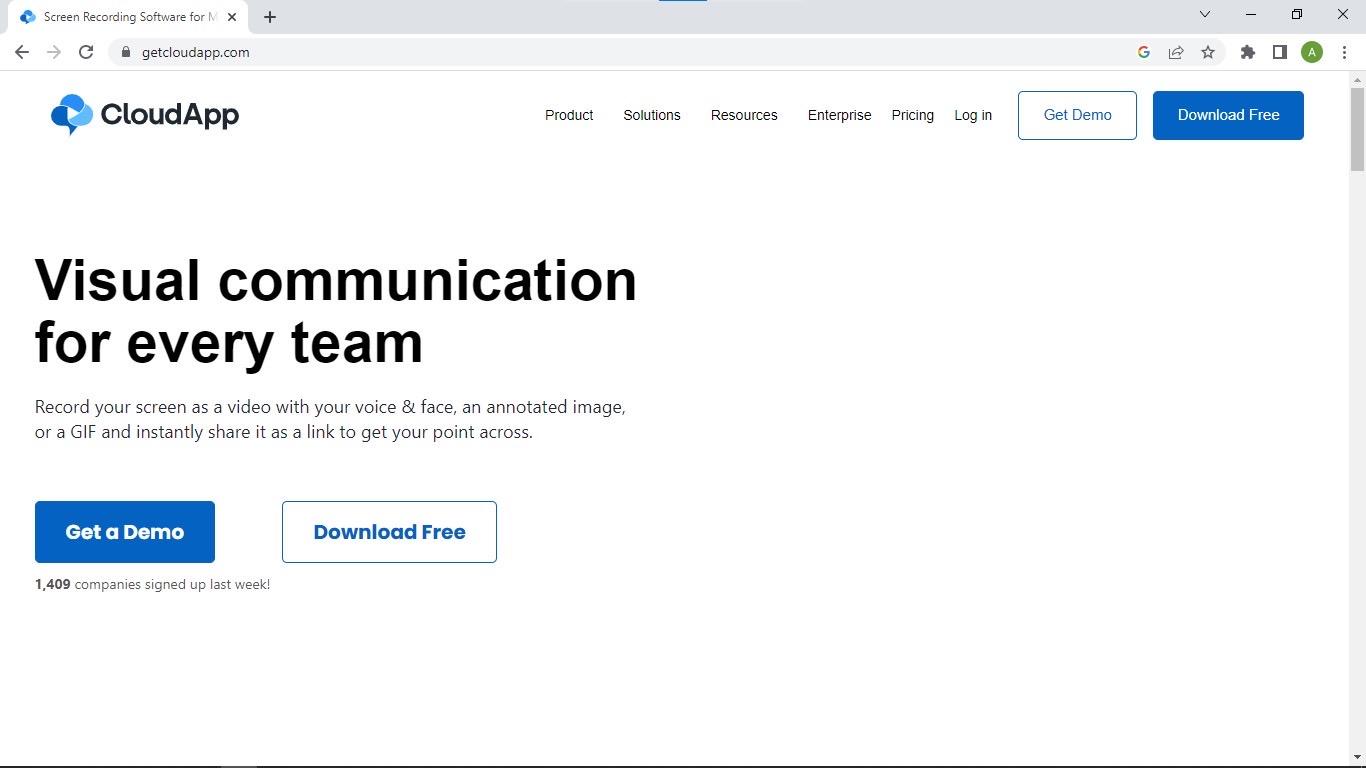
Hybrid Work Tool – CloudApp
What CloudApp Is Used For
- Your work is automatically saved in the cloud and may be accessed from any device.
- Use custom, encrypted short links to share the files online.
- You can capture screenshots and annotate them with text, arrows, and other shapes.
Supported Platforms: Windows and macOS.
CloudApp’s Price Plans: Free to $9.95 per month
Customer Ratings:
- G2: 4.7/5 (1,195 Reviews)
- Capterra: 4.6/5 (179 Reviews)
Nifty
Nifty is a team collaboration platform offering unique features to help teams work smarter in a hybrid working environment. Its focus on productivity and efficiency sets Nifty apart from other team collaboration tools. It offers a Kanban-style project management interface that allows teams to visualize their workflows and track progress in real-time. It also provides a time-tracking feature that helps teams to stay on top of their schedules and deadlines.
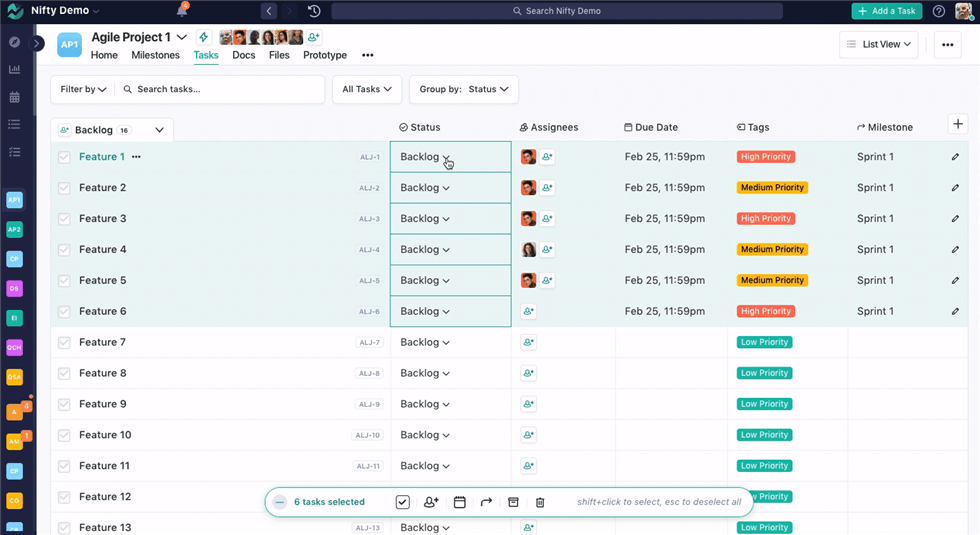
Hybrid Work Tool – Nifty
What Nifty Is Used For
- Includes a team communication feature that enables teams to collaborate and share information seamlessly.
- Offers a file-sharing feature that allows teams to store and access their files and documents from anywhere.
- Its unique features and intuitive interface make it easy to use and highly effective for the team’s productivity.
Supported Platforms: Windows, macOS, Android, and iOS.
Nifty’s Price Plans: $39/monthly
Customer Ratings:
- G2: 4.7/5 (418 Reviews)
- Capterra: 4.7/5 (385 Reviews)
Trello
It is common to practice for hybrid teams to work together remotely to concentrate on a narrow set of goals. Trello, on the other hand, allows you to centralize all of your teams’ work in one spot. Trello is a task management and collaboration platform that centralizes your projects, resources, and groups under a single interface.
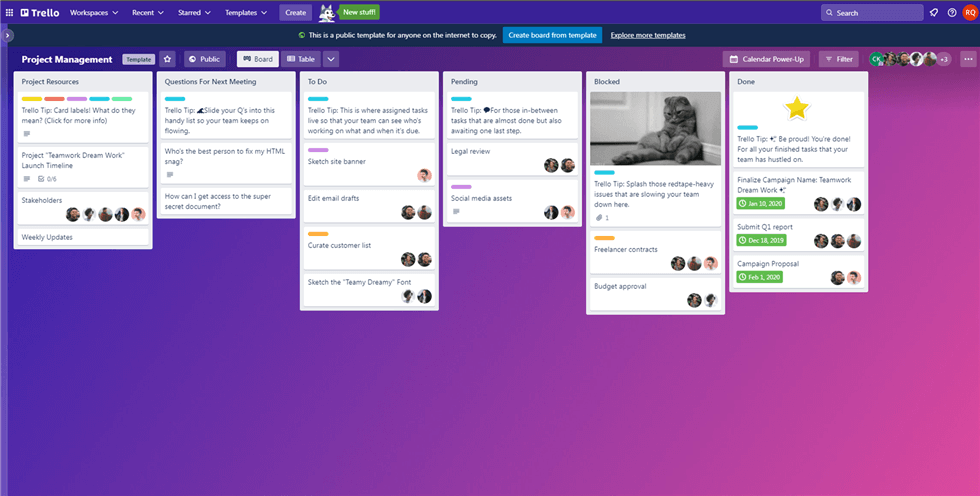
Hybrid Work Tool – Trello
What Trello Is Used For
- You can use boards, lists, and cards to keep track of tasks and assign responsibilities.
- Whether you’re using it for brainstorming or managing a project, Trello can help you stay organized and on top of everyone’s deadlines.
- Helps you analyze your direct reports and ensure that all other workers in the organization are on the same page
Supported Platforms: Windows, macOS, Android, and iOS.
Trello’s Price Plans: Free to $5 per month
Customer Ratings:
- G2: 4.4/5 (13,083 Reviews)
- Capterra: 4.5/5 (22,366 Reviews)
Asana
Asana is a versatile collaboration application that can be used as a basic to-do list tracker or as a full-fledged project management software to reduce the amount of email and maintain tabs on what’s being worked on and by whom throughout a business. With a short learning curve, users can quickly get up and running with this collaboration tool. Asana’s user interface (UI) and user experience are also among the best in the industry.
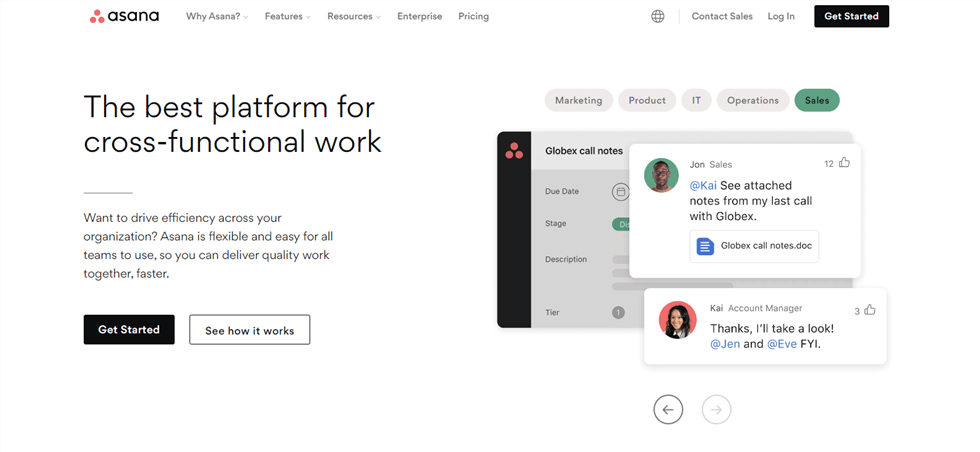
Hybrid Work Tool – Asana
What Asana Is Used For
- Integrates with a wide variety of programs that facilitate online communications.
- Provides a central location where your team’s work can be seen in several formats, including lists, boards, and chronological timelines.
- Gives you space to store files, create subtasks, sort using labels, and annotate with comments on tasks.
Supported Platforms: Windows, macOS, Android, and iOS.
Asana’s Price Plans: Free to $10.99 per month
Customer Ratings:
- G2: 4.3/5 (9,222 Reviews)
- Capterra: 4.5/5 (11,924 Reviews)
Confluence
Confluence is a platform for teams to collaborate and share knowledge in a single centralized location. Confluence is a powerful tool that allows teams to create, organize, and share content in a collaborative environment. Teams can create pages, share documents, and work together in real-time to edit and update content.
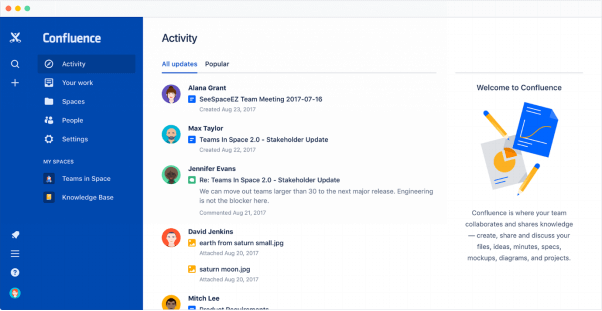
Hybrid Work Tool – Confluence
What Confluence Is Used For
- Includes commenting and feedback features, which make it easy for team members to give feedback and discuss ideas.
- Makes it easy to find the information you need, whether you’re looking for a specific document, page, or piece of information.
- Allows team to keep track of tasks, deadlines, and progress in one place
Supported Platforms: Windows, macOS, Android, and iOS.
Confluence’s Price Plans: Free to $10 per month
Customer Ratings:
- G2: 4.1/5 (3,550 Reviews)
- Capterra: 4.4/5 (2,856 Reviews)
Loom
Millions of people across the globe use Loom, a communication app that records your screen, audio, and camera. Next, you can customize your films with annotations and CTAs before publishing them through a public URL that anybody, Loom account or not, may see.
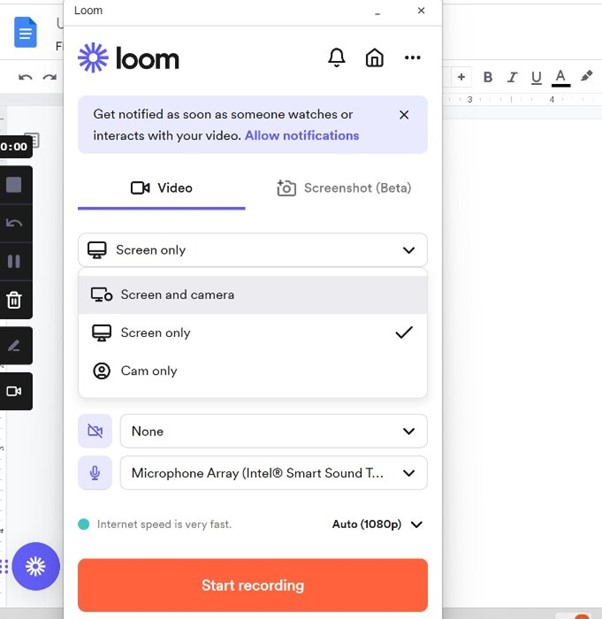
Hybrid Work Tool – Loom
What Loom Is Used For
- Supports the sharing of links to public folders containing numerous videos.
- Employs a Secure Sockets Layer (SSL) to secure data and provides limitless video storage.
- Works with popular services like Gmail and Slack
Supported Platforms: Windows, macOS, Android, and iOS.
Loom’s Price Plans: $8/monthly
Customer Ratings:
- G2: 4.7/5 (1,081 Reviews)
- Capterra: 4.7/5 (346 Reviews)
Scribe
Scribe is a powerful documentation tool developed for developers working in a hybrid environment. It is designed to make it easy for teams to collaborate on creating and managing API documentation. Multiple team members can work on the same document simultaneously, ensuring that everyone is on the same page and that the documentation is accurate and up-to-date.
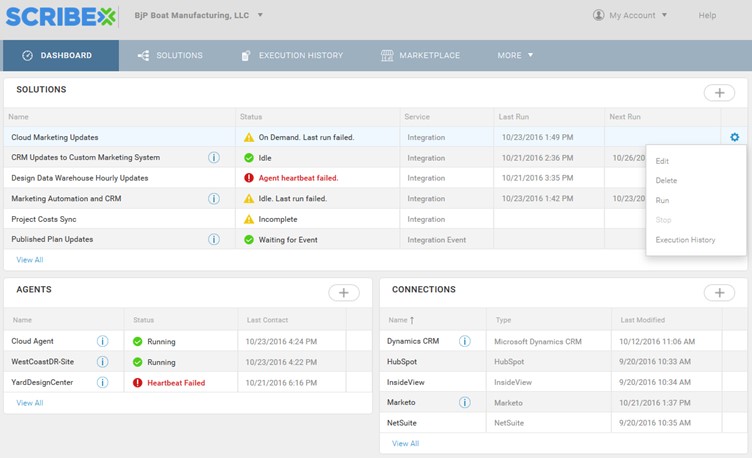
Hybrid Work Tool – Scribe
What Scribe Is Used For
- With Scribe, teams can create, edit, and review API documentation in real time.
- Includes a range of pre-built templates and themes, which can be customized to fit the needs of your team or organization.
- Can integrate with various popular API development tools, such as Swagger and Postman.
Supported Platforms: Windows, macOS, Android, and iOS
Scribe’s Price Plans: Free to $23 per month
Customer Ratings:
- G2: 4.8/5 (61 Reviews)
- Capterra: 4.5/5 (2 Reviews)
What Are the Pros and Cons of Hybrid Working?
Like every other thing, Hybrid working also has some pros and cons.
Pros
- Increased productivity
- Cost-effective
- Easier for employees
- Increased employee retention
- A meaningful relationship with coworkers
Cons
- No physical collaboration with employees
- Hard to manage the staff
- Security concerns
Final Thought
Hybrid work has become the new normal for many organizations, and having the right tools to support collaboration and productivity is essential. To manage that effectively, you need Hybrid Working Tools. And we hope you’ve got the best hybrid working tool after reading this article. Moreover, we would love to hear about your experiences with these tools or any other hybrid work tools you recommend, so share them in the comment section.



